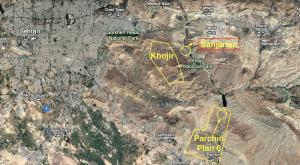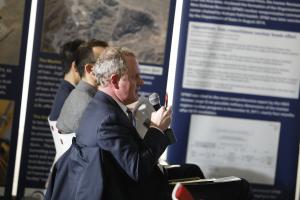Iran's Regime Ramps Up Efforts on Nuclear Detonators, Says NCRI’s Washington Office

Ms. Soona Samsami, the US Representative of the National Council of Resistance of Iran, delivers the opening remarks during the NCRI-US press conference to reveal critical information about Iran’s nuclear weaponization program, December 19, 2024 - DC
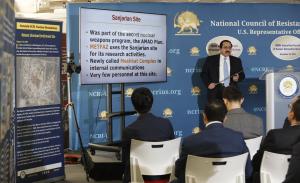
Alireza Jafarzadeh, deputy director of the NCRI’s Washington office, unveils critical information about Iran’s nuclear weaponization program during the NCRI-US press conference on December 19, 2024, in Washington, DC
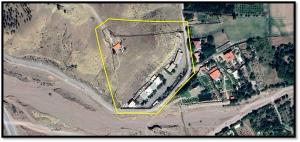
New 2024 imagery of the Sanjarian site, newly renamed Meshkat complex, disclosed during a press conference held by NCRI-US to reveal critical information about Iran’s nuclear weaponization program, December 19, 2024, Washington, DC
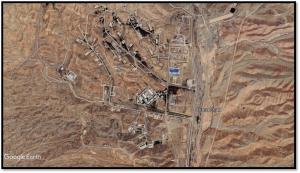
New 2024 Satellite Imagery of Plan Area 6 with new structures, disclosed during a press conference held by NCRI-US to reveal critical information about Iran’s nuclear weaponization program, December 19, 2024, Washington, DC
Stark warning about Tehran’s escalated activities aimed at developing nuclear weapons, according to recent intelligence gathered by the Iranian Resistance.
WASHINGTON, DC, UNITED STATES, December 20, 2024 /EINPresswire.com/ -- In a press conference today, the Washington Office of the National Council of Resistance of Iran (NCRI) issued a stark warning about the Iranian regime’s escalated activities aimed at developing nuclear weapons, particularly focusing on detonators crucial for nuclear explosions.
Soona Samsami, the NCRI’s U.S. Representative, and Alireza Jafarzadeh, the Washington Office’s Deputy Director, addressed the conference.
According to recent intelligence gathered by the Iranian Resistance, the METFAZ facility—officially known as the Center for Research and Expansion of Technologies on Explosions and Impact—is spearheading these efforts under the country’s secretive military apparatus.
METFAZ operates as a subdivision of the Organization for Advanced Defense Research (SPND), a unit of the Iranian Ministry of Defense that has long been under international scrutiny for its role in potential weaponization efforts. Brigadier General Reza Mozafarinia, who reports directly to the Minister of Defense, Brigadier General Aziz Nasirzadeh, commands this critical operation.
According to the Defense and Strategic Research Committee of the National Council of Resistance of Iran, based on reports received by the network inside Iran of the People’s Mojahedin Organization of Iran (PMOI/MEK) in December 2024, the report highlights intensified activities at the Sanjarian site, now internally referred to as the Meshkat Complex. This heavily guarded and highly secretive location serves as the primary research and development ground for nuclear detonation technologies, including the controversial Exploding Bridgewire (EBW) detonators. Such detonators are essential for triggering nuclear explosions and have been a central issue in negotiations between Iran and the International Atomic Energy Agency (IAEA).
Further complicating the transparency of Iran’s nuclear ambitions, METFAZ is reported to conduct some of its operations under the guise of Arvin Kimia Abzar, a company ostensibly involved in the oil and gas sector. However, the NCRI asserts that this company is a cover for the regime’s work on high-explosive materials, with key personnel deeply embedded in nuclear weapons projects.
Saeed Borji, chairman of the board, and Akbar Motallebizadeh, CEO, are central figures in these operations. Both have extensive backgrounds in the military and defense sectors, particularly in nuclear weapons development. Borji, a longstanding member of the Islamic Revolutionary Guard Corps (IRGC) since 1980, has been involved in numerous nuclear weapon projects, while Motallebizadeh heads the Advanced Materials Research and Technology Center, another segment of SPND focusing on chemical experiments.
In her remarks, Samsami said: “I must underscore the urgent reality we face today. The Iranian regime, battered by setbacks in the region, is aggressively pushing forward with its nuclear ambitions, specifically accelerating the development of a nuclear warhead at facilities like METFAZ. This activity is carried out under the guise of civilian enterprises, but make no mistake—it is driven by the regime’s defense sectors and aims to arm Iran with nuclear capabilities. The international community must prioritize immediate and unrestricted IAEA access to these sites to prevent Iran from further advancing toward nuclear armament."
Pointing to the regime’s three-decade-long policy of denial, deception, and duplicity regarding its nuclear weapons program, Samsami added: “The Iranian regime has demonstrated a consistent pattern of deceit and obstruction in its nuclear program, particularly in the weaponization aspects crucial for the development of a nuclear bomb. Despite clear warnings and extensive intelligence provided by the Iranian Resistance over the years, the regime has exploited periods of diplomatic engagement to advance its nuclear ambitions covertly. It is time for the international community to acknowledge the failure of past approaches and respond with decisive actions, including reinstating comprehensive sanctions and ensuring rigorous inspections. The safety of the region and the broader international community depends on our resolve to prevent this regime from acquiring nuclear weapons."
Alireza Jafarzadeh, the Deputy Director of the NCRI’s Washington Office, emphasized the urgency of the situation: “The international community must act swiftly to address these developments. Our intelligence confirms that the regime is advancing its nuclear weapons program under the cover of civilian applications. This violates international treaties and poses a grave threat to regional and global security."
Jafarzadeh further called for immediate inspections of the newly identified sites by the IAEA and for the international community to reimpose stringent sanctions that were relaxed in recent years. “Transparency is non-existent in the regime's nuclear program, and their deception has reached new heights. It is crucial for the United Nations Security Council to take decisive action and for the IAEA to be granted access to these critical sites without further delay."
He urged the international community and the IAEA to focus not just on the quantity and enrichment levels of uranium but on the weaponization aspects of Iran's nuclear activities. The NCRI advocates for referring Iran's nuclear dossier to the United Nations Security Council and reinstating all related sanctions through a snapback mechanism.
Jafarzadeh highlighted the long-term solution and said, "There is only one sure way to end the threat of the nuclear weapons program of the Iranian regime, and that's ending the rule of the mullahs in Iran, and that's the responsibility of the people of Iran, the organized resistance, the Resistance Units in Iran and the National Council of Resistance of Iran as the alternative to this regime.
The NCRI has been at the forefront of exposing the Iranian regime’s nuclear activities for over two decades, often providing pivotal information that has led to international inspections and sanctions, including the August 2002 revelation about the Natanz nuclear enrichment site and the Heavy Water facility in Arak. This latest revelation is part of the group’s ongoing efforts to prevent Iran from acquiring nuclear weapons capabilities, support international efforts to curb Iran's nuclear ambitions, and advocate for a democratic transition in Iran.
For further details, inquiries can be directed to the NCRI-US website.
Alireza Jafarzadeh
National Council of Resistance of Iran, U.S. Office
+1 202-747-7847
email us here
Visit us on social media:
Facebook
X
LinkedIn
Instagram
YouTube
TikTok
Other
Legal Disclaimer:
EIN Presswire provides this news content "as is" without warranty of any kind. We do not accept any responsibility or liability for the accuracy, content, images, videos, licenses, completeness, legality, or reliability of the information contained in this article. If you have any complaints or copyright issues related to this article, kindly contact the author above.

